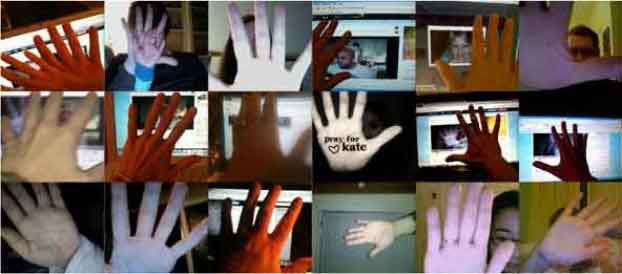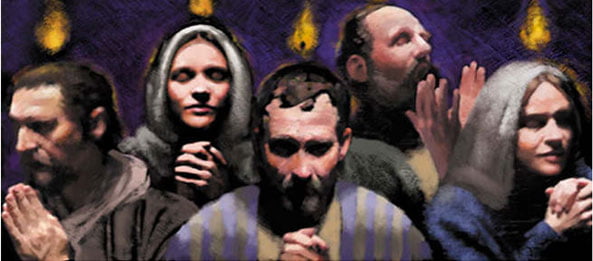All Gifted All Minister
1 Corinthians 12.1-3, 7-11, 14.26-33
Some were sceptical. Clearly there was power among them. Two experienced healing as power surged through their bodies. A few spoke under inspiration of the troubles others were engaged in. It was supernatural alright, but was it good. Many in the crowded room had recently abandoned the cults and magic arts to follow Christ. Except for a few Jews among them most had grown up believing in the gods of the temples. Some had even been gifted by these spirits. But this new power felt different; it left them with an inner peace and a bubbly joy. But was it really different? Was it really the Spirit Jesus had promised? Most of them believed it was; most were enthusiastic. But a few were sceptical.
This was probably the situation when Paul wrote “Now about spiritual gifts, brothers, I do not want you to be ignorant. You know that when you were pagans, somehow or other you were influenced and led astray to mute idols. Therefore I tell you that no one who is speaking by the Spirit of God says “Jesus be cursed,” and no one can say “Jesus is Lord,” except by the Holy Spirit. There are different kinds of gifts, but the same Spirit … To each one the manifestation of the Spirit is given for the common good” (12.1-7). Paul was assuring the Corinthians that the supernatural manifestations among them were the work of one Holy Spirit and not many evil ones. Those who were sceptical had assumed that the different manifestations were different spirits. In an attempt convince them that these manifestations were from the God and Father of Jesus, Paul appeals to the fact that the supernatural words given had spoken well of Jesus, and even confessed him as Lord. The application for us today is this: A congregation full of former members of cults and magic arts had more reason to be weary of supernatural manifestations than most of our westernized churches today. And Paul told them not to fear, for it was a genuine work of God. So the message to us is this: Stop fearing the gifts and manifestations of God’s Holy Spirit! …But let’s take this a bit further.
It was quite an experience. The room was crammed with young people; some sitting on chairs, others on the floor, a few stood leaning against the walls. The speaker finished his brief message and people began to respond. One reinforced his main point with an example from his own life, another guy said he felt God was saying something specific to the group and shared it. Two girls were tearful and said God’s Spirit was on them, so a few put their hands on them and prayed. Some who prayed spoke prophetically of the one girl’s future. Afterwards one of the guitarists finished the meeting off with a song that he said the Spirit was urging him to play. When I read about the Corinthian church I am reminded of this popular youth ministry in South Africa. Everyone was free to contribute as the Spirit guided them. In Corinth there were words of encouragement, prophecy, songs, tongues and interpretation among the various gifts (14.26-33). The Corinthian church was lively and full of outspoken people, the problem was making sure they did not all speak at the same time, so Paul calls them to order telling them to take turns (29-31). This is an interesting solution. So many churches today would restrict the ministry to leaders; so only a leader can prophecy or lay hands. But Paul tells the ordinary people to take turns. Clearly Paul believed in the priesthood of all believers (1 Peter 2.9), and believed the gathered church was a forum for all to express spiritual gifting.
Many believers today are tired of the abuses associated with the ‘one man show;’ pastors pushing people over, preachers making false claims of healing, rows of people at the front being treated as numbers. We only push people because we want to look as good as we did last week when God was doing it, and we make false claims of healing for the same reason. And we treat people as numbers because there are too many for one person to give personal attention to. But the solution to all this is in Scripture: Empower the congregation; disciple them in the gifts; then the guy up front isn’t under pressure to look good, and the people are equipped to minister.
The Day of Pentecost provides another interesting scenario. Paul tells the Corinthians to take turns speaking in tongues and to make sure that each tongue is interpreted (1 Co 14.27-28). But when the Holy Spirit was poured out on the Day of Pentecost everyone spoke in tongues at the same time and there was no interpretation (Acts 2.1-12). The noise made by all 120 people (1.15) speaking in tongues drew a crowd from the surroundings. Was this disorder? Was this ungodly? The obvious answer is no. So how is it still in line with what Paul taught the Corinthians? Well, when Paul wrote to the Corinthians the issue was public speaking: addressing the whole room. When each person is addressing the whole congregation they need to take turns so each can be heard. But the tongue-talkers on the Day of Pentecost were not addressing the whole room; they were addressing a few individuals in their specific language. So the person that spoke out in Egyptian was heard by the one or two that were from Egypt, and the person who spoke out in Libyan was heard by the one or two from Libya. In other words, this was more like one to one ministry or small group ministry in a crowded room. And no interpretation was need because the language was understood by those who spoke those languages. So this provides another biblical model for ministry: It’s ok for the whole congregation to minister one to one or in small groups all across a crowded hall. And just as these tongue-talkers were “declaring the wonders of God” (2.11), it’s biblical for the congregation to speak God’s words to each other through individual prophecy, tongues, and words of knowledge. This also applies to the gift of healing which is listed with all the manifestations in 1 Co 12.9 and usually involves the laying of hands. The Pentecost model provides a perfect environment for the discipleship of gifts. In fact we see the benefit as the church in Acts grew. At first it was mainly the twelve apostles that did healings and imparted the Holy Spirit (they had been trained by Jesus), but soon we see others like Stephen (6.8), Philip (8.6), and Ananias doing it. Who was Ananias? He was the guy who laid hands on Paul to heal him of blindness and get him filled with the Holy Spirit (9.17). Was he an apostle or a leader? No; just an ordinary disciple (9.10) like you and me. He probably had a corner shop that marketed new wineskins.
So Mr Nobody-Ananias lays hands to heal and impart the Holy Spirit, which means any believer can. “But what if an ordinary member has a demon and lays hands on me; won’t the demon be transferred to me?” I ask the question because it’s a common fear among Kenyan believers (In fact I addressed this in the post: Handing out the Bread of Life). Jesus actually answers the question for us. “Ask and it will be given to you; seek and you will find … Which of you fathers, if your son asks for a fish, will give him a snake instead? … If you … know how to give good gifts to your children, how much more will your Father in heaven give the Holy Spirit to those who ask him!” (Lk 11.9-13). Jesus is saying that if you seek the Holy Spirit you won’t be given an evil spirit. God is in control, he will not allow that to happen to those who seek Him. I have been in churches that allow the whole congregation to lay hands for 28 years and I have never seen a demon transferred through laying hands. Scripture tells us to pray for each other, not to fear who is praying. So I am of the opinion that it is an unnecessary fear that hinders freedom and discipleship.
Recently I was moved by a photo of children laying hands on adults. They were calling on God with a simple, uncluttered faith. No wonder Jesus said “the kingdom of heaven belongs to such as these” (Mt 19.14). May we become like them.







